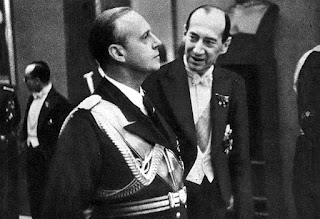Eighty years ago, Poland Feels Its Way In the Post-Munich World, the Vice Closes on Catalonia, the Japanese Old Guard Fades Away and a Machine Speaks
The Polish Foreign Minister
Colonel Beck paid an official visit to Munich for talks with the Nazi leadership
including Hitler and Foreign Minister von Ribbentrop. Poland was still in process of finding its place in a Europe
that had been reshaped by the Czech crisis in September. Poland had been happy to
seize Teschen from Czechoslovakia whilst it was helpless in the face of German
aggression but had not entered into any long term deal. Poland had its usual
quota of Balkan territorial claims in which Germany might provide further
support. Germany for its part would have liked Poland to join the Anti-Comintern
pact, more as a loose alliance of non-democratic states than out of any
particular fear of the USSR. But Poland as a Versailles creation had been
granted much old German territory which the Reich ultimately wanted back.
The vice was closing on what
remained of Republican Catalonia. In the north it was mainly Franco’s own
forces and in the south the attackers were predominantly Italian. The Italian
advance stalled until Spanish troops were detached to help them make the key
breakthrough. The Littorio division, then an infantry formation but later to
become famous as an armoured division in North Africa, took Borjas Blancas a
key route centre which left the Republican army a single axis along which to
retreat to Barcelona. Never was the pretence that the Italians fighting in
Spain were volunteers more hollow.
The last of the conservative old guard faded
away in Japan as Prince Konoe resigned as prime minister, making way for the
overtly nationalistic Hiranuma. Debate on foreign policy was dominated by the
question of how far Japan should ally itself with Nazi Germany. For all his
nationalist background, Hiranuma recognised that Japan was already
over-stretched in China took a conservative stance on the narrow question. The
drift towards uncontrolled expansionism, though, faced one less obstacle.
The Bell Laboratories displayed
in Philadelphia one of the precursors of the age of electronics. The Voder
could – just – synthesize human speech electromechanically. From breaking
speech into discrete component sounds, Bell had moved to reproduce and combine
these at will. It did not have an authentic human accent and its first phrase
as was – fittingly – “patience is necessary.” It was the first step to
digitizing speech.



Comments
Post a Comment